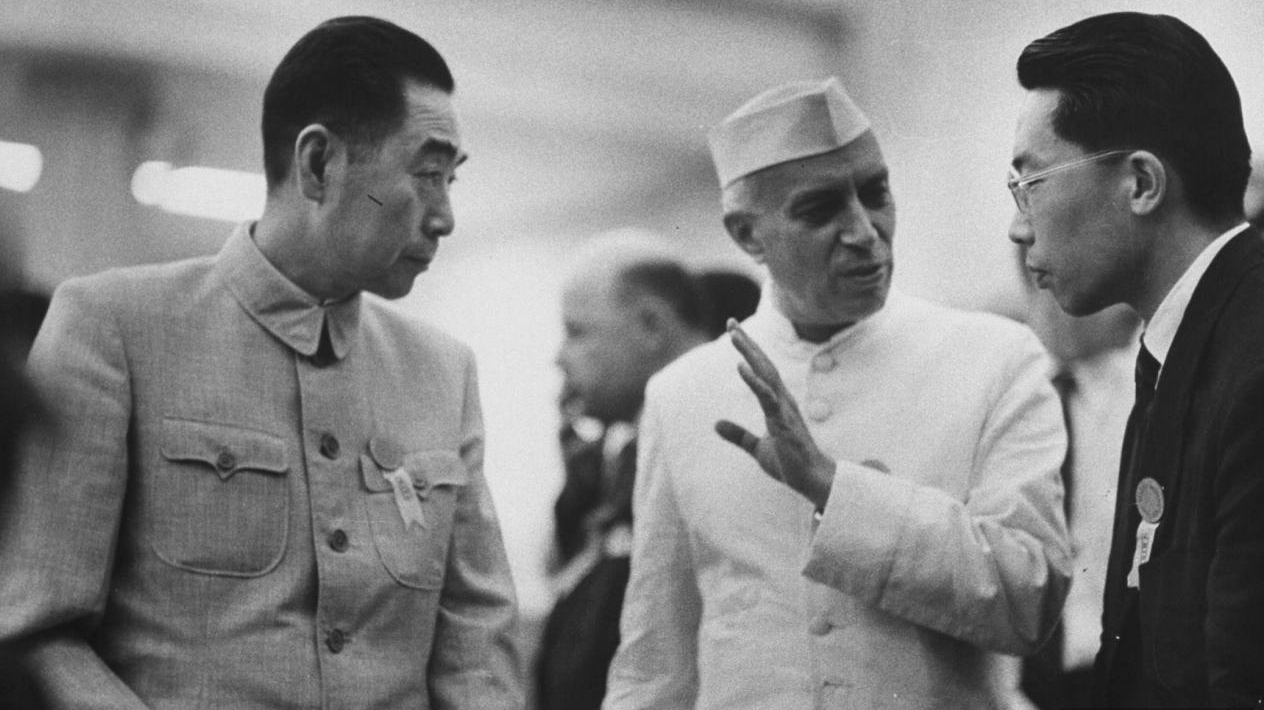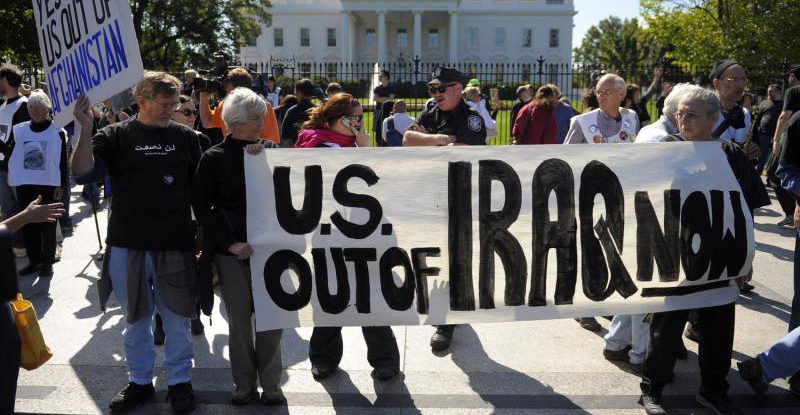‘Five Principles’still offer solid basis for peace

In Dec. 1953, Premier Zhou Enlai, pictured above (left) listening to Indian Prime Minister Jawaharlal Nehru, proposed the “Five Principles” to mitigate Chinese-Indian border disputes during a bilateral negotiation. Nehru remarked, “If these principles were recognized in the mutual relations of all countries, indeed there would hardly be any conflict and certainly no war.”

Protestors gather outside of the White House to call for an end to the US occupation of Iraq and Afghanistan.
The “Five Principles of Peaceful Coexistence” that China formulated together with countries, such as India and Myanmar, more than half a century ago remain central to the nation’s foreign policy. From a broad perspective, the idea is China’s unique contribution to the foundation of international relations and law.
Beyond classical international law
German legal theorist Wolfgang Friedmann saw classical international law as a “law of coexistence” composed of a set of moderating rules, such as non-interference in internal affairs, respect for national sovereignty and state immunity. At minimum, it mandates peaceful coexistence among sovereign states. A large portion of its content involves international diplomatic relations.
The “Five Principles of Peaceful Coexistence” emphasize non-aggression, equality and mutual benefit, which can be considered a step forward from the principles of classical international law. For emerging countries, the principles are essential to survival. From the vantage point of modern history, China’s emphasis on the “Five Principles” is a bid for survival and a measure of self-protection against foreign invasions like the ones that brought a century of humiliations starting with the First Opium War (1840-42).
Before the advent of the Westphalian system, East Asia had functioned under a set of diplomatic rules radically different from those of the medieval and modern European political structure. The East Asian system was hierarchical in nature, with China at the top. This Sino-centric order gradually disintegrated during the period from the outbreak of the First Opium War to the end of the 19th century as China was forced into the Western-dominated treaty system and deprived of autonomy. The country continued to be beset by domestic turmoil and foreign aggression until the conclusion of World War II.
After its founding in 1949, the People’s Republic of China was compelled to deal with Western hostility and the Cold War. In this vein, China, as a sovereign state, had to acknowledge its fundamental stance before developing diplomatic relations with other countries. The “Five Principles of Peaceful Coexistence” are the essence of that stance. The idea of sovereignty ushered in a paradigmatic shift in China’s self-perception and a disambiguation of relations with the outside world.
Minimal structure of world order
The historical path of a country plays a definitive role in its outlook on and the narrative of world order. In the past century, Sino-centrism ceased to be a justifiable mental and discursive approach to world order. China’s survival has been largely predicated upon the notions of sovereignty and territory.
Respect for territorial integrity and sovereignty, non-aggression, and non-interference in the internal affairs of others are at the core of the “Five Principles of Peaceful Coexistence”. Logically derived from the concept of sovereignty, they also underpin China’s outlook on world order.
The three core principles are prohibitive rules in essence. By safeguarding national sovereignty, they have stabilized the international system. In this sense, classical international law, with its emphasis on sovereignty, can be considered the baseline of a more elaborate world order in that it only regulates countries’ external behaviors, while leaving them in charge of their own domestic affairs.
Moreover, it does not seek to impose normative rules on cross-national interactions. Instead, its essential concern lies in the dignity of individual countries per se. Each unit of the international system can continue to exist if it abides by the classical international law. Peaceful coexistence can be achieved if countries act in compliance with the three core principles.
An important concept in the study of international relations, “domestic analogy” equates individuals at home with countries in the international community and assumes that rules governing the formation of domestic order are readily applicable to global scenarios. Such an analogical approach to international affairs was transformed. In the 19th and early 20th centuries, most scholars mainly focused on the organizational structure of the world order.
After the Cold War, scholarly attention shifted to the domestic origin of countries’ international behaviors as various branches of interventionism gained currency in the United States. In the first decade of the 21st century, the analogical approach went extreme and encouraged the George W. Bush administration to adopt a foreign policy that was based on regime change.
Needless to say, foreign policy strategies that rely on regime change are fundamentally at odds with the concept of sovereign equality, which remains the cornerstone of modern international law. Decision makers who have a polarized analogical mindset tend to compare other countries’ social, economic and political systems to their own while adopting a condescending position and relegating target countries to a subordinate status.
Reciprocity , joint development
In Chinese diplomacy, equality and reciprocity are usually in juxtaposition. The concept of reciprocity overlaps with principles of soft law. In an era of global interdependence, no country can take such a concept lightly. In Chinese foreign policy, reciprocity has dual layers of meaning. For one, China’s focus lies in maximizing mutual benefit and engaging in transnational cooperation instead of altering other countries’ social, economic and political systems. Such a pragmatic mentality is diametrically opposed to the Western preoccupation with other countries’ domestic institutions. Also, upholding the three core principles of peaceful co-existence is in itself a reciprocal gesture. If the international system is in a state of Nash equilibrium, every stakeholder would benefit from its own strategy.
According to recent interdisciplinary research, an ideal international legal system is comparable to the Nash equilibrium, given that a common ground will emerge if each country makes its own rational decision while fully understanding other countries’ potential moves. In areas where international law matters the most, such a two-way mode of thinking would motivate all stakeholders to strategically comply with international law.
China’s reciprocal stance is particularly evident in its outbound direct investments and trade practices. In the area of economic cooperation, many developing countries have obtained much-needed monetary resources from China, and their raw materials have entered the Chinese market. China has also achieved market expansion in terms of both import and export values. The Asia Infrastructure Investment Bank, the New Development Bank BRICS, and “the Belt and Road” initiative are all aimed at reciprocal cooperation.
China’s state-building project is predicated on a peaceful macro environment. In addition to the “Five Principles”, China should formulate its own stance on the pressing issues of environmental deterioration, regional conflicts, humanitarian crises and the vicious aspects of globalization, economic integration, population boom and technological progress. China must play an active role in building a collaboration-based emergency response mechanism and clarifying joint responsibilities and shared rights.
After World War II, the emphasis of international law gradually shifted from coexistence to cooperation. Scholars observe that international law has become a shaping force of global life. In response to such a paradigmatic shift, China came up with the concepts of “common security”, “joint development” and “reciprocal cooperation,” extending the scope of the “Five Principles”. To be clear, common interest may or may not have a binding effect. Nonetheless, it is conducive to the formation of binding rules.
Mou Wenfu is an associate research fellow at the Sichuan Academy of Social Sciences.
